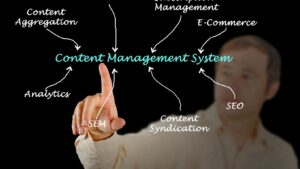 Are you ready to dive into the world of content management systems? Exploring how to navigate these powerful tools can be a game-changer for individuals and businesses alike. Whether you’re a seasoned professional looking to enhance your skills or a beginner eager to learn, understanding content management systems is key to staying ahead in today’s digital landscape. In this article, you’ll uncover the ins and outs of learning content management systems. From mastering the basics to discovering advanced techniques, this guide will equip you with the knowledge needed to harness the full potential of these platforms. Get ready to unlock a world of possibilities as you delve into the realm of content management systems and take your digital presence to new heights.
Are you ready to dive into the world of content management systems? Exploring how to navigate these powerful tools can be a game-changer for individuals and businesses alike. Whether you’re a seasoned professional looking to enhance your skills or a beginner eager to learn, understanding content management systems is key to staying ahead in today’s digital landscape. In this article, you’ll uncover the ins and outs of learning content management systems. From mastering the basics to discovering advanced techniques, this guide will equip you with the knowledge needed to harness the full potential of these platforms. Get ready to unlock a world of possibilities as you delve into the realm of content management systems and take your digital presence to new heights.
Learning Content Management Systems
Understanding content management systems (CMS) is crucial for those navigating the digital realm. Whether individuals or businesses, grasping CMS fundamentals is essential. This section delves into the process of mastering CMS, from the basics to advanced strategies. Readers will gain comprehensive insights to leverage these robust tools effectively and boost their online presence.
Benefits of Learning Content Management Systems
 Content management systems (CMS) offer various advantages to individuals and businesses aiming to enhance their online presence. Mastering CMS provides crucial skills for effective digital navigation, improving overall website management and content optimization.
Content management systems (CMS) offer various advantages to individuals and businesses aiming to enhance their online presence. Mastering CMS provides crucial skills for effective digital navigation, improving overall website management and content optimization.
Enhanced Learning Experience
Learning content management systems provides users with hands-on experience in website development and maintenance. It allows individuals to familiarize themselves with diverse tools and functionalities, enhancing their technical proficiency in managing online platforms effectively.
Customization and Adaptability
CMS platforms offer extensive customization options, allowing users to tailor their websites to meet specific requirements and preferences. The adaptability of CMS tools empowers individuals to create unique and personalized online experiences for their target audience, enhancing engagement and user satisfaction.
Ideal Practices for Implementing Learning Content Management Systems
Implementing learning content management systems (CMS) requires adherence to ideal practices for optimal outcomes. By following these guidelines diligently, individuals and businesses can effectively harness the power of CMS platforms.
Understanding User Needs and Objectives
- Aligning with User Goals: Tailor the CMS implementation to meet the specific needs and objectives of the users. Customizing the system to align with user preferences enhances engagement and usability.
- Conducting User Training: Provide comprehensive training to users on how to navigate and utilize the CMS effectively. Empowering users with the necessary knowledge ensures smooth operations and maximizes productivity.
Content Organization and Structure
- Establishing a Hierarchical Structure: Design the CMS with a clear and intuitive hierarchical structure for easy navigation. Organizing content in a logical manner enhances user experience and simplifies content management.
- Implementing Metadata Tagging: Utilize metadata tagging to categorize and label content accurately. Tagging facilitates content searchability, making it easier for users to locate specific information efficiently.
Security and Permissions Management
- Setting Access Controls: Define appropriate access controls and permissions levels to restrict unauthorized access to sensitive information. Implementing robust security measures safeguards data integrity and protects against potential threats.
- Regular Security Updates: Stay updated with the latest security patches and software upgrades to mitigate vulnerabilities. Ensuring the CMS is fortified with the latest security features enhances system reliability and resilience.
Performance Monitoring and Optimization
- Monitoring System Performance: Regularly monitor the CMS performance metrics to identify bottlenecks and areas for improvement. Tracking system performance enables timely interventions to optimize efficiency.
- Optimizing Loading Speed: Enhance the loading speed of the CMS by optimizing images, minimizing plugins, and streamlining code. Improving loading times enhances user experience and boosts website accessibility..
Future Trends in Learning Content Management Systems
As the digital landscape continues to evolve, mastering content management systems (CMS) will be essential for individuals and businesses alike. The future of learning CMS lies in embracing emerging technologies that streamline content creation and management processes. AI integration, voice search optimization, and mobile responsiveness are key trends to watch out for in the CMS space. By staying updated on these advancements, users can stay ahead of the curve and maximize the potential of their online platforms. Continuous learning and adaptation to new CMS features will be crucial in navigating the ever-changing digital environment successfully.


